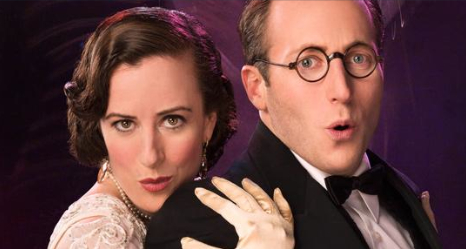Lear decides to divide his remaining days between daughters Goneril and Regan but his life begins to unravel when his daughters make demands he is unwilling to accept. Lear, with his mind rapidly declining, grows frustrated, disowns them both and wanders off into a dangerous storm.
In the second thread of the story the Earl of Gloucester’s illegitimate son Edmund plots to defame his father’s legitimate son Edgar so he might gain the inheritance he feels he deserves. Edmund tells the Earl that Edgar is plotting to kill him then tells Edgar that the Earl has discovered his plan and is searching for him as they speak. Edgar flees and disguises himself as a beggar. Edgar and Lear cross paths in the storm and are soon encountered by the Earl. Taking mercy on demented Lear, the Earl leads him to Dover to meet with Cordelia who has recently returned to England at the head of the French army. Lear’s elder daughters punish the Earl for his loyalty to Lear (huge kudos to props department for their work in this scene) but it is Lear who ultimately pays the highest price.
KING LEAR gets off to a slow and quiet start with a somewhat subdued Benedict Campbell (Lear) making his way down a flight of steps. Both Campbell’s and Andrea Rankin’s (Cordelia) voices seem to fade at the end of their sentences making it a challenge to follow the dialogue. Bard regulars like Colleen Wheeler (Goneril), Jennifer Lines (Regan), and Scott Bellis (Fool) have perhaps an edge of advantage with little trouble negotiating the arena. Campbell picks it up in the second half and breathes life into Lear but David Marr (Earl of Gloucester) and Michael Blake (Edmund) steal virtually every scene they are in, as does the impeccable Jennifer Lines. Marr, Blake, and Lines bring an energy and life to the dialogue that oozes from every word. Coupled with a profound understanding of body movement and expression they own every word they utter with the greatest of honesty and commitment. Bellis often wonderfully rescues slower scenes with his physicality and agility but at times his actions pull attention away when the focus should be elsewhere. John Murphy (Earl of Kent) is a welcome blend of humour and drama in an otherwise progressively somber play.
Deitra Kalyn’s costumes are intricately elegant with a gradual degradation in colour as the story slips further into bleakness, brilliant golds fading to grays and blacks, and fight directors Haysam Kadri and Karl Sine design action that is intricate and unnerving to watch.
KING LEAR is a long and at times tough play to follow but a rare and exceptional experience. Check it out HERE and get tickets while they last.
LOVE'S LABOUR'S LOST
The story opens in the city of Navarre where King Ferdinand (Jay Hindle) vows to abstain from all vices for three years, especially women. Ferdinand runs a gambling joint on the South Side of Chicago and has decided to clean up his act. He enlists his two pals Berowne (Josh Epstein) and Dumaine (Daniel Doheny) to pledge their loyalty and join him in his quest. Once the three have sealed their pact Ferdinand proclaims that no woman shall enter his establishment until they have fulfilled their pledge. The three men while away the time with a visitor to their city, Don Adriano de Armado (Andrew McNee) who immediately falls in love with Jaquenetta (Dawn Petten), a flapper at the club. The resolve of the men is put to the test when three beautiful young women roll into town and try to enter Ferdinand’s gambling joint. Princess (Lindsey Angell) and her two friends Rosaline (Luisa Jojic) and Katharine (Sereana Malani) are looking for Ferdinand. Princess has come to discuss a debt her father owes. The three women send the three oath-bound men into a tizzy and the games begin. The men scheme to maneuver around their vows to get closer to the women and the women lead them on chase of their own. In true Shakespearian fashion, all’s well that ends well.
From the top of the show the actors are on their game, singing and playing with the audience as they take their seats. If you are brave enough to sit in the front seats you may be called upon to interact with a cast member: a treasured experience.
The intro of George Gershwin's "But Not For Me" brings the audience into the story nicely and showcases the voices and dancing of the actors. Ben Elliott (Holofernes) is hilarious as the disgruntled piano player playing off Andrew McNee (Don Adriano de Armado) and Andrew Cownden (Costard) to equal triumph. Lili Beaudoin (Moth) is adorable as pageboy to Armado, Dawn Petten is equally delightful as the naively insensible flapper from Jersey, and Lindsey Angell’s voice is mesmerizing. The casting is great and the performances are strong but it is the direction that stands out with Cloran's brilliant insight and transformation of Shakespeare to vaudeville. Songs like Irving Berlin's “Blue Skies” are great crowd pleasers and the actors play to the audience's reactions. Andrew McNee is unmatchable in his execution of the macho yet malleable Don Armado. Josh Epstein plays up a loose mustache to the amusement of the crowd (if it wasn’t intentional, keep it in) and Andrew Cownden’s timing and versatility is impressive.
LOVE’S LABOUR’S LOST is Shakespeare as you may never see him again. Be sure to check out tickets and times HERE.



 RSS Feed
RSS Feed
